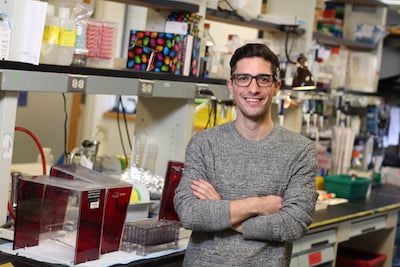
MD/PhD candidate Philip A. Feinberg |
|
Philip A. Feinberg, an MD/PhD candidate studying in the lab of Dorothy P. Schafer, PhD, has been named a predoctoral fellow by Autism Speaks, a global nonprofit organization dedicated to promoting solutions for the needs of people with autism and their families. Feinberg is one of 26 researchers who will share $4.7 million in grant funding to advance autism research; the two-year fellowship comes with a $35,000 annual award.
“I am honored to be awarded this pre-doctoral fellowship from Autism Speaks which will support me in my training towards becoming a physician scientist,” Feinberg said. Ultimately, he would like to focus his research to “advance our understanding of neuropsychiatric disorders like autism and work to develop new therapies that can offer my patients the best possible outcomes.”
“This is an amazing honor for Philip and our lab. He is a talented MD/PhD student who is committed to becoming a successful physician-scientist and he has expressed interest in working in pediatrics long-term. This award will provide a strong foundation for him to pursue this goal,” said Dr. Schafer, assistant professor of neurobiology.
Autism Speaks Chief Science Officer Thomas Frazier, PhD, said, “Investing in science is critical to achieving our mission to help people with autism and deliver solutions across the spectrum and throughout the life span. This year’s funding supports projects that will help us understand autism better and lead us to more personalized care and services.”
Feinberg will investigate the inflammatory microglia in mice as a contributor to the excitatory-inhibitory balance of neurons. The mouse data will also be compared with functional MRI data of human subjects who have Autism Spectrum Disorder and inflammatory markers to identify new targets for treating ASD.
Feinberg’s research will give the Schafer lab “an unprecedented opportunity to interact more closely with physicians at UMass Medical School working with individuals with autism,” Schafer said.
“Through these interactions, we will identify immune molecules that are changed in autism spectrum disorders and then mechanistically dissect how these molecules regulate brain circuit development and function on a cellular level in my lab. I anticipate very exciting crosstalk between my basic science lab and clinical research at UMMS, which could ultimately lead to a better understanding of brain development and autism,” said Schafer.